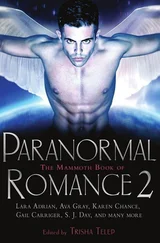Jeannie Holmes - The Mammoth Book of Futuristic Romance
Здесь есть возможность читать онлайн «Jeannie Holmes - The Mammoth Book of Futuristic Romance» весь текст электронной книги совершенно бесплатно (целиком полную версию без сокращений). В некоторых случаях можно слушать аудио, скачать через торрент в формате fb2 и присутствует краткое содержание. Жанр: Старинная литература, на английском языке. Описание произведения, (предисловие) а так же отзывы посетителей доступны на портале библиотеки ЛибКат.
- Название:The Mammoth Book of Futuristic Romance
- Автор:
- Жанр:
- Год:неизвестен
- ISBN:нет данных
- Рейтинг книги:3 / 5. Голосов: 1
-
Избранное:Добавить в избранное
- Отзывы:
-
Ваша оценка:
- 60
- 1
- 2
- 3
- 4
- 5
The Mammoth Book of Futuristic Romance: краткое содержание, описание и аннотация
Предлагаем к чтению аннотацию, описание, краткое содержание или предисловие (зависит от того, что написал сам автор книги «The Mammoth Book of Futuristic Romance»). Если вы не нашли необходимую информацию о книге — напишите в комментариях, мы постараемся отыскать её.
The Mammoth Book of Futuristic Romance — читать онлайн бесплатно полную книгу (весь текст) целиком
Ниже представлен текст книги, разбитый по страницам. Система сохранения места последней прочитанной страницы, позволяет с удобством читать онлайн бесплатно книгу «The Mammoth Book of Futuristic Romance», без необходимости каждый раз заново искать на чём Вы остановились. Поставьте закладку, и сможете в любой момент перейти на страницу, на которой закончили чтение.
Интервал:
Закладка:
“To hide the ship from ground observation, we have to look like part of the landscape. That means no heat signature and no engine vibration,” I said. “Come into atmosphere mimicking a meteor. Leave behind some space rocks for the government types to find after the fact. You’ll get written up in a document so classified not even the president will see it. The official news story will say ‘meteorite’. To avoid casual observation, we’ll look for a wind storm. Preferably, a really strong one. We want blowing snow that will cool and coat the surface of the ship.”
“Physical camouflage?” Trygg said, his tone dubious.
“We call it hiding in plain sight.”
“It’s a recipe for genocide,” Grisham huffed.
Carrollus spun on his captain and snapped, “We have no shields, no weapons, and no other, viable ideas, sir. Ms Selkirk is trying to offer us the opportunity to finally stop running.”
Is that what I was doing?
“As Ms Selkirk has so charmingly reminded us,” Grisham retorted, “we drugged and kidnapped her.
What makes you think she’s remotely interested in helping us?”
I stared at him. “One: do you really think I blame every man, woman and child on this ship? Two: I can’t help but notice that if I sit on my ass doing nothing to help, it gets vaporized, too!”
“Finlay, what else?” Carrollus prompted.
I turned my attention to him. “Do you have a topographical map?”
A lieutenant with spiky brown hair and green eyes manned the table’s controls. “Lieutenant Vran, ma’am. And yes. We do.”
The map appeared.
“Can you make this section bigger?” I asked.
Carrollus reached past me and expanded the map where I’d indicated.
I hoped no one detected the tremor in my hand as I gestured at the image suspended above the black table. “This is an aerial topography map of the region where I propose you put down.”
Captain and commander came closer, peering at the lines and colors hovering in the air before them.
“Alaska,” Carrollus said.
Pointing out a broad swathe of the interior of the state, I said, “We’d aim for this region. Low population density, violent winter storms, intractable wilderness. There’s one added element in our favor.
Lieutenant? Do you have access to magnetic anomaly data? I’ll also need current weather conditions for this region.”
“Yes, ma’am.”
The map lit up with color.
“Alaska aligns low population density with high-intensity magnetic fields at the mountainous regions best able to hide the ship. It makes landing trickier, because the magnetic disturbance will wreak havoc with shipboard instruments.”
“Our technology doesn’t rely on magnetic fields,” Carrollus replied.
“Good,” I said. “Earth-based technology does . Our navigational instruments are impacted by both magnetic anomalies and by the electrical noise produced by a strong aurora event.”
He nodded.
I pointed to a mountain range on the map. “Right here, we have both things going on at once. That’ll make life tough for anyone trying to navigate there, except us. Weather reports indicate winds in the region blowing snow and ice in excess of twenty-five miles per hour. That’s not as strong as I would like, but given the snow-pack reports, we should find the blowing snow adequate to our needs.”
The captain peered over her shoulder at the map.
“If anyone sees us coming in, they’ll think we’re a meteor coming down in the wilderness. No one will wander into the worst of the magnetic anomalies at night. Most humans won’t willingly venture into a strong magnetic vortex at any time. Something about intense magnetic fields induces dizziness, nausea and skewed perception. I may be affected, even aboard this ship. Once the ship is on the ground, chances we’ll be seen are low.”
“Vortices?” Grisham echoed, disdain in his tone.
“You’ve seen some of the New-Age claims regarding them, I take it,” I said. “Whether magnetic phenomena are at the root of the New-Age vortex mythos, I cannot say, but I can say that magnetic phenomena were of significant interest to the US military at one time.”
The captain studied me, calculation in the narrowing of his eyes. “How do you know?”
“My father was a physicist with the Air Force. He specialized in magnetic fields. He used non-
classified data to spark my interest in science.”
“The military wanted magnetic weapons?”
“Shielding,” I countered. “Magnetic fields can make something close look far away, distort an object’s true size, thus throwing off targeting. I’m suggesting using naturally occurring magnetic fields to our advantage.”
Grisham looked skeptical, but he nodded.
“When you take off all hell will break loose,” I went on. “The military will see the ship, and they will scramble jets again. You’ll want out of atmosphere as quickly as possible, and you may need to take up position behind something of size to avoid having all of Earth’s telescopes pointed at you. Assuming you choose to remain in this solar system.”
“If this works,” Carrollus said, “this solar system will be the safest place for us.”
“Not for much longer,” I replied. “With the current speed of scientific advancement on Earth, you won’t be able to hide indefinitely. When our measurements become accurate enough to detect your mass influencing the orbit of nearby bodies, you’ll have real problems.”
“We have to survive the Orseggans, first,” Carrollus said.
“Agreed,” Grisham weighed in. “Analysis.”
“Without shields or weapons,” Carrollus said, “our options are run or hide. If we leave the solar system, the Orseggans have a shot at picking up an exhaust trail. We’d abandon hundreds of our people planetside, not to mention destroying years of intelligence work spent infiltrating native governments.”
Interesting. They’d put agents on Earth? Surely I could use that as a bargaining chip. Somehow.
“Chances we could bring weapons online before the Orseggans reach sensor range?” Grisham demanded.
Carrollus shook his head. “The real question is whether we can destroy the scouts before they detect us. This crew hasn’t faced battle. The lack of experience both with weapon systems and combat tactics gives us very low chances of ambushing and destroying them before the Orseggans fire off a distress call.”
Grisham grunted. “Thereby confirming our existence and our location.”
“Hiding is our best option.”
“What if the Orseggans decide to investigate the aurora, see if they can punch through?” I prompted, wanting all the contingencies on the table.
Lieutenant Vran answered. “If we go dark, as you’re suggesting, and if the hull has cooled in the wind and snow, we will look like part of the landscape at best. At worst, we’ll resemble one of the military installations dotting the region, assuming the Orseggans would risk detection and destruction by pressing into the atmosphere for a closer look.”
“Destruction?” I echoed.
“An F-15’s payload would penetrate the scouts’ hulls,” Carrollus explained. “Scouts are built for speed, not combat.”
“If they come poke you with a stick, they’ll have the US Air Force swarming them in short order,” I mused. Uneasiness gnawed at the inside of my breastbone. Making my species aware of aliens in the solar system could be a disaster. Chaos and panic would result. We’d made and distributed too many science-
fiction movies in the past several decades to hope humankind would welcome men and women from Mars with open arms.
“Sir?” Carrollus turned on the captain.
Grisham sighed. “If we fail, it will mean the end of our kind. And the deaths of people we’ve taken into our protection.”
Читать дальшеИнтервал:
Закладка:
Похожие книги на «The Mammoth Book of Futuristic Romance»
Представляем Вашему вниманию похожие книги на «The Mammoth Book of Futuristic Romance» списком для выбора. Мы отобрали схожую по названию и смыслу литературу в надежде предоставить читателям больше вариантов отыскать новые, интересные, ещё непрочитанные произведения.
Обсуждение, отзывы о книге «The Mammoth Book of Futuristic Romance» и просто собственные мнения читателей. Оставьте ваши комментарии, напишите, что Вы думаете о произведении, его смысле или главных героях. Укажите что конкретно понравилось, а что нет, и почему Вы так считаете.












